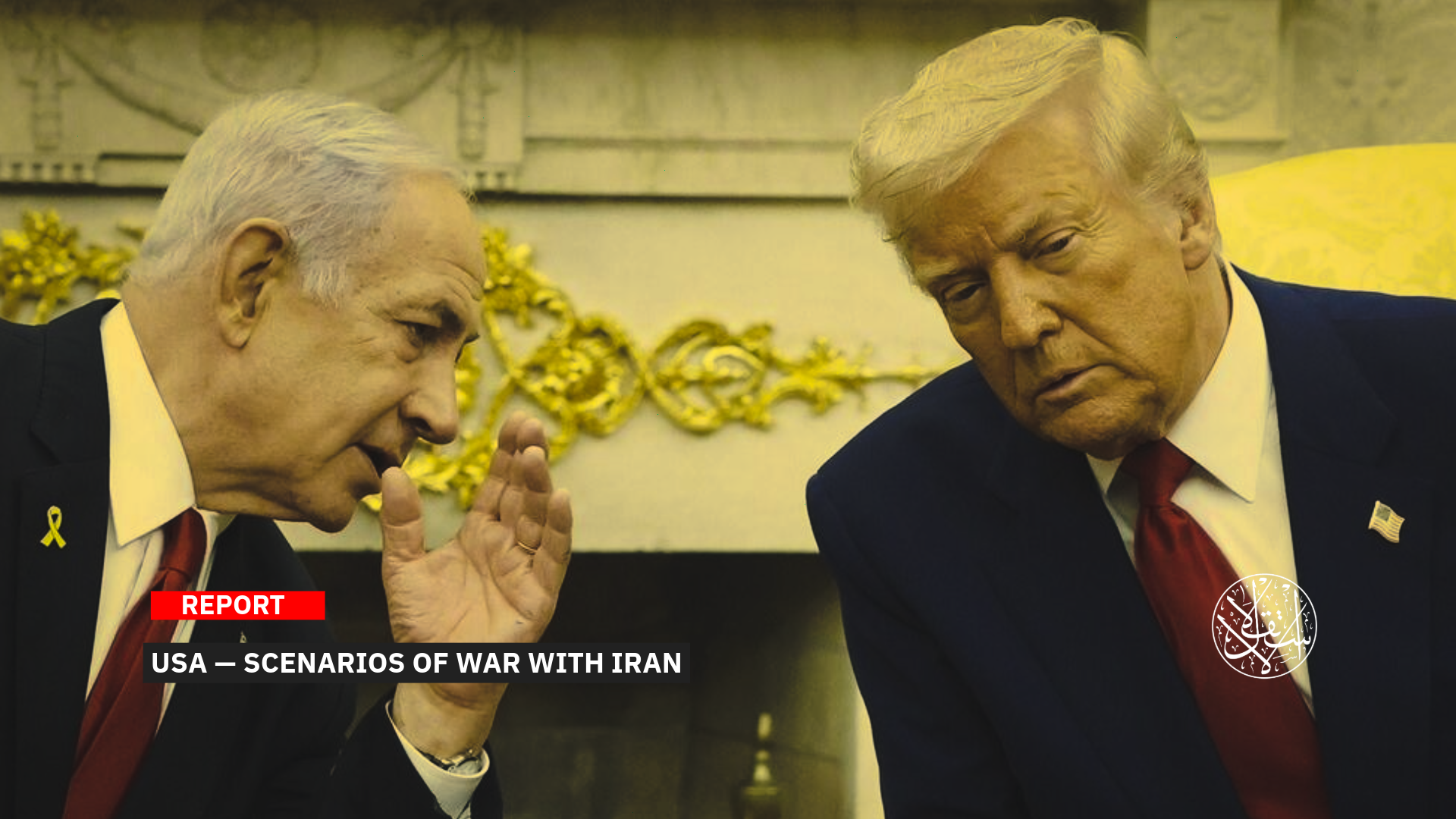Disastrous Scenarios: What If the U.S. Goes to War with Iran?

“Israel” has asked the United States to officially intervene in the war against Iran.
Since “Israel” started war on Iran on June 13, 2025, President Trump’s administration has been sending mixed messages, publicly denying involvement in the attack, while at the same time warning it could destroy Tehran.
Amid these conflicting messages, U.S. media have reported “rare” divisions within Trump’s camp and the MAGA movement. One faction of hawks is pushing for direct involvement in the war alongside “Israel” and for the destruction of Iran’s nuclear program. The other faction—also pro-”Israel”—argues that Trump’s campaign was built on avoiding the costly wars of the past and prioritizing regional and global stability to serve Washington’s economic interests.
This second group warns that any official U.S. military intervention could provoke Iranian retaliation against American bases and interests in the Middle East, potentially undermining the financial gains Trump secured from Gulf countries.

Yes or No?
“Israel” has asked the United States to officially intervene in the war against Iran, but Trump’s statements on whether to do so have been contradictory, according to U.S. and Israeli sources.
Trump has consistently denied any involvement in the attack on Iran or any intention to enter the war, but U.S. media have published analyses suggesting Netanyahu is trying to drag him in.
As Iran's strikes on “Israel” intensified and MAGA hardliners called for action—either direct involvement or by supplying Tel Aviv with strategic bombers and bunker-buster bombs to target Iran’s Fordow nuclear facility—Trump said, “We're not involved in it. It’s possible we could get involved.”
His comments sent mixed signals: one moment suggesting military action against Iran, the next proposing a deal to end the war between Iran and “Israel.”
This reflects a state of confusion and shows Trump’s sense of being cornered by Tel Aviv’s worsening situation, with American outlets noting that the Iranian strikes are too intense for “Israel” to withstand for many weeks.
“The U.S. had nothing to do with the attack on Iran, tonight. If we are attacked in any way, shape, or form by Iran, the full strength and might of the U.S. Armed Forces will come down on you at levels never seen before,” Trump warned.
Earlier, on Truth Social, Trump said Tehran and Tel Aviv will enjoy peace soon, noting that many meetings were underway and that both countries should reach an agreement and end the war.
“Iran and Israel should make a deal, and will make a deal, just like I got India and Pakistan to make,” he posted.
In an interview with ABC News’ Rachel Scott, Trump said the United States is not involved in “Israel's military strikes against Iran,” but “it's possible we could get involved.”
Any direct U.S. intervention would likely make American bases in the Gulf immediate targets for Iranian missiles, jeopardizing U.S. allies; and if the U.S. does officially enter the war, it may escalate further: Pakistan has declared its support for Iran.
Israel’s Channel 10 reported that Islamabad warned Washington it would stand against “Israel” if Iran were attacked with nuclear weapons.
Meanwhile, Britain has moved fighter jets and missiles to the Middle East, with a destroyer assisting in guiding Israeli drones bombing Iran.
Turkiye, too, remains on alert; its National Security Council is in constant session, and its fighter jets have issued warnings to Israeli aircraft to stay out of Syrian airspace.

Trump’s Dilemma
Trump’s conflicting statements suggest that Netanyahu has dragged him into this risky venture, miscalculating the scale of Iranian losses and assuming they would be enough to force Tehran into surrender. Now, Trump faces two options: either intervene in the war to destroy Iran’s nuclear facilities, as Netanyahu urges, or seek a ceasefire agreement.
But Trump appears hesitant about the second option, as it may mean the Israeli war has failed to achieve its goal—forcing Iran to sign a nuclear deal on U.S. terms—and could even allow Iran to set its own conditions.
His past actions, particularly reports that he misled Iran into provoking the Israeli strike, have further eroded Tehran’s trust.
On June 15, Haaretz revealed that 28 American refueling aircraft flew toward “Israel,” possibly to support its attacks against Iran.
A day earlier, a U.S. official told Axios that “Israel” had asked the Trump administration to take part in strikes aimed at eliminating Iran’s nuclear program, specifically the Fordow facility, which the Israeli Occupation cannot destroy alone due to its lack of bunker-busting bombs and heavy bombers.
Still, the Trump administration is currently not considering joining the Israeli strikes. However, an Israeli official told the outlet that Washington is studying the request, and Trump has reportedly told Netanyahu he would act “if necessary.”
Meanwhile, the United States remains committed to negotiations and hopes Iran “will come to the table soon,” one senior U.S. official told The Washington Post, speaking on the condition of anonymity to discuss sensitive negotiations.
A sixth round of talks was scheduled in Muscat on June 15, but Iranian Foreign Minister Abbas Araghchi dismissed the idea, saying there is no justification for continuing the negotiations, and accusing the U.S. of “directly supporting Israeli aggression.”
Although the U.S. has not officially declared war on Iran, the Trump administration is effectively fighting alongside “Israel”—American and European warplanes and naval ships (from Germany, France, and the UK) are helping intercept Iranian missiles and drones targeting Tel Aviv.
At the same time, Washington is supplying the Israeli Occupation with advanced weaponry, yet has stopped short of formally entering the war.
According to a June 14 assessment by Israel’s Institute for National Security Studies (INSS), the U.S. will soon have to make a strategic decision about its non-intervention policy.
The institute claimed that “Israel’s” failure to inflict major damage on Iran’s nuclear infrastructure may eventually push the U.S. toward direct involvement.
It argued that only a credible U.S. military threat—or actual engagement—might compel Iran to agree to a deal aligned with Trump’s core goal.
However, the institute noted that such U.S. intervention would likely depend on Iran causing direct harm to American interests, inflicting severe damage inside “Israel,” or launching attacks on strategic targets in U.S.-aligned countries—scenarios that could shift Washington’s current calculation.
The institute also warned that Iran’s recent decision to end cooperation with the International Atomic Energy Agency—and the possibility of withdrawing from the Treaty on the Non-Proliferation of Nuclear Weapons—could be seen as crossing a red line on the global stage.

A Difficult Position
Trump now finds himself in an increasingly difficult spot—trapped between his “America First” foreign policy and the political fallout from “Israel’s” attack on Iran, which has triggered internal divisions within his administration, according to Politico.
Although Trump campaigned on ending America’s “forever wars,” he now faces the risk of being pulled into another Middle East conflict—not by his own decision, but as a consequence of “Israel’s unilateral actions.”
Israeli Occupation’s strike on Iran’s nuclear facilities threatens to draw the U.S. into direct military involvement, despite official denials of any American role.
Making things worse, Trump’s MAGA base—known for its staunch opposition to foreign entanglements—rejects any U.S. involvement in Middle Eastern wars. Prominent voices within the movement, such as Saagar Enjeti and Charlie Kirk, have warned that joining the war would betray Trump’s core campaign promise and could carry serious political consequences ahead of the 2026 midterms.
Politico paints a troubling picture: either Trump lacks the influence to restrain America’s closest ally, or he tacitly approved the strike against the will of his political base—an accusation his administration denies.
According to the outlet’s analysis, Trump now faces two unappealing choices: allow “Israel” to bear the brunt of Iranian retaliation alone, or intervene militarily and risk dragging the U.S. into yet another prolonged war.
MAGA-aligned commentators like Matt Boyle argue that Trump’s next move could define his presidency, as he tries to balance loyalty to “Israel” with the isolationist priorities of his supporters.
This tension has reportedly pushed Trump to double down on diplomacy. On his Truth Social platform, he reaffirmed his commitment to a peaceful resolution with Iran and claimed that his administration had been instructed to continue negotiations. He also spoke publicly about pursuing a ceasefire deal.
Former Pentagon adviser Douglas Macgregor has warned that “Israel’s” reckless move could trigger a broader regional war—even a nuclear one. “We have 40,000 troops in the UAE, Qatar, across the Persian Gulf. They are sitting ducks,” he said.
“Iranian Shahed-136 Drones cost $20,000 each. American Patriot Missiles cost $4 million per interceptor. Do the math. We will run through our inventory of missiles and go broke while Americans come home in boxes.”
A Looming Disaster
Rosemary Kelanic, Director of the Middle East Program at the Defense Priorities think tank, called a potential U.S. war with Iran “a disaster.” In a June 14 piece for The New York Times, she warned that America is alarmingly close to being dragged into yet another Middle East conflict—this time by a supposed ally that no longer seems like a true friend.
She argued that Israel’s sudden assault on Iran has killed off any realistic chance of a nuclear agreement that Washington had been pursuing for months. In doing so, Netanyahu has recklessly endangered American forces in the region and raised the risk of a direct U.S.–Iran war.
Kelanic warned that if Trump caves to pressure from Netanyahu and American hawks to help destroy Iran’s uranium enrichment facilities—something even the U.S. military might struggle to achieve—it would be “the worst mistake of Mr. Trump’s presidency.”
“A war with Iran would be a catastrophe, the culminating failure of decades of regional overreach by the United States and exactly the sort of policy that Mr. Trump has long railed against,” she wrote.
Kelanic recalled the 2003 invasion of Iraq, based on false claims about weapons of mass destruction, which plunged the country into chaos and civil war, ultimately empowering Iran through the rise of proxy militias.
She stressed that there’s no reason to believe a war with Iran would go any more smoothly. It could be far worse.
Even after spending $7 billion on a failed campaign against the Houthis, the U.S. still couldn’t secure air superiority over Yemen, let alone against Iran.
Unlike the Houthis, Iran is far more capable of defending itself. If Washington’s airstrikes fail to eliminate Iran’s nuclear capabilities, pressure could mount for a disastrous ground invasion.
And even in the best-case scenario, where U.S. strikes destroy most of Iran’s nuclear sites, this would only delay Tehran’s nuclear ambitions—not eliminate them.
Kelanic concluded that the best path forward is either diplomacy or strategic restraint.
“For all the Iranian government’s faults, a bad government is preferable to the chaos of no government. Do we really want to turn Iran into a failed state, like Iraq or Libya after the United States attacked those countries?”
Sources
- Scoop: U.S. tells allies it won't join war unless Iran targets Americans
- Trump Offers Mixed Messages on Israel-Iran War
- America Must Not Get Dragged Into a War With Iran
- Israel urges U.S. to join war with Iran to eliminate nuclear program
- A U.S. War With Iran Would Be a Catastrophe
- Trump says 'it's possible' US gets involved in Israel-Iran conflict
- The MAGA split over Israel








